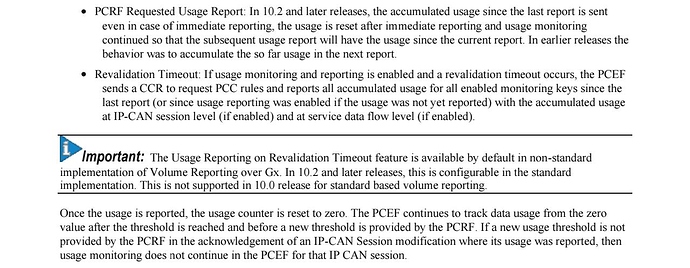Anyone knows about pcrf functions
read section 3.5
What if pcrf is sending revalidation timeout ! Does my IP session gone start or not? If this is coming, Pcef is sending this to pcrf so does my default bearer will create or not!
Experts pls reply
PCRF is able to indicate to a PCEF a revalidation time (Revalidation- Time AVP), which indicates the time (e.g. Network Time Protocol (NTP) time) before which the PCEF will have to re-request the PCC rules. This value is provided with the REVALIDATION_TIMEOUT event trigger in a Credit Control Answer (CCA) or a Reauthorization Request (RAR) message. This prevents the sending of large amounts of control signalling (signalling storms) between the PCEF and the PCRF when the authorization state for a service (i.e. authorized/non-authorized) changes, as the PCEF initiates a request to update the authorization state before the end of the current period. It has been recognised here that, whilst there are standardised mechanisms for allowing a PCRF to control the characteristics of a dynamic service (i.e. whose associated PCC rules are provisioned by the PCRF to the PCEF), such as the Maximum Bit Rate (MBR) and rating group of the service, there are no standardised mechanisms for allowing the PCRF to control the characteristics of pre-defined services (i.e. whose associated PCC rules are pre-defined in the PCEF)
The PCRF also includes the Event-Trigger AVP with the
REVALIDATION_TIMEOUT value within the CCA, indicating that a revalidation timeout should trigger the PCEF to send a re-request to the PCRF. The Revalidation-Time AVP indicates the time at which the re- request should be sent.
A5. The PCEF receives the CCA and uses the SCP identifiers to locate the
Service Characteristic Profiles amongst those that have been pre- configured at the PCEF. The PCEF identifies that SCP 1 specifies a bandwidth limit of 3 Mbps for P2P services, and that SCP 2 specifies a bandwidth limit of 1 Mbps for P2P services. The PCEF begins applying SCP 1 to the bearer as it is currently within the activation time defined for that profile.
A6. When the PCEF reaches the deactivation time defined for SCP 1 , the PCEF stops applying SCP 1 . This time coincides with the activation time of SCP 2 such that the PCEF simultaneously begins applying SCP 2 to the bearer. When the PCEF reaches the revalidation time it sends a CCR message to the PCRF to request new profile information, and specifies within the Event-Trigger AVP that the REVALIDATION_TIMEOUT caused the modification.
Upon receiving the CCR the PCRF re-evaluates the profile selection rules and responds to the CCR with a CCA message including the Charging- Rule-lnstallation AVP that now includes the profile identifier(s) those Service Characteristic Profiles that are now applicable, and time of day information for those profiles or for each of the characteristics defined in the profiles.
Amazing dude!
If scp 1 and scp 2 will not alocate then data bearer will not create and user will not get any kind of data from p getway right
We will be in one team one day r&d department:joy:



If scp 1 and scp 2 will not alocate then data bearer will not create and user will not get any kind of data from p getway right
if both are not allocated than only…
if scp 1 not available scp 2 will make communicate
scp 1 defauly bandwidth 3 mbps
scp 2 will be 1 mbps
for all communicate especially p2p
Cool understand
reverse can never happen… like scp 1 is there and scp 2 got failed
incase of scp 1 getting failed… not reachable than only scp 2 will come into play
Hi all,
What are the cases in those PCRF will trigger RAR from PCRF to P-gw
Thanks
KK
without getting SNR request from OCS still PCRF can trigger RAR to network if yes then WHY?

